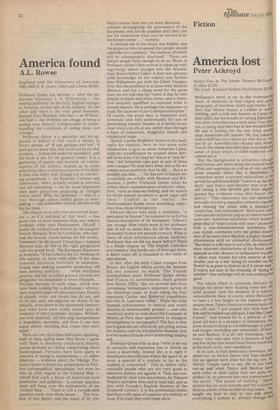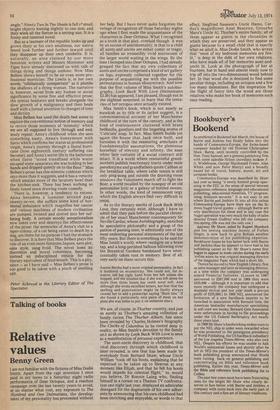Fiction
America lost
Peter Ackroyd
Ninety-Two In The Shade Thomas McGuane (Collins £2.50) The Limit Rosalind Belben (Hutchinson £2.45)
McGuane's novel is set in the riverrunning heart of America, in that vague and pull)). geography of marshes, inlets and creeks. It IS
here that Nichol Dance, a Caliban in Ariel's clothing, and a cold sole known as Carter plY their skiffs, for the benefit of visiting fishermen Into their icthyolatrous womb sinks Tom Skel"
ton, a young man who has at last escaped from life and is looking for the real thing among what Americans call 'nature.' He, too, takes UP with a skiff but you cannot go very far or veil fast in an Ameridiluvian swamp and Nine Two In The Shade describes that overwhelming sense of place which invades someone wile
cannot move.
But the background is attractive enough, small towns and inlets being the natural hoine of fish and vegetation as well as of vice, and the prose amasses detail like a Baedekker.
somewhat more wayward naturalism is re', served for sad humankind: "Leave it at the fue' dock,' said Dance now blearier than ever but
still letting a thin deVilish gas from slightlY pursed lips evidence some dire bowel die.
mistry." This represents the old American principle of yoking opposites violently together, and viewing the result with a mixture or scepticism and amusement. McGuane cata: lyses pseudo-technical jargon (evidence here of some dire American machismo which makes a great deal of "man's work well done", etcetera) with -a non-denominational quirkiness, his
own stylish comments with the gilded dreari-lness of his meta-hero Skelton, a highly literarY allusiveness with an elemental obviousness: "But there is a life that is not a life, in which the more adamant obstructions of the heart masquerade as loss, dreams or carburettor trouble. A silent man wastes his own swerve of molecules; just as a bee 'doing its number on the,, flower' is as gone to history as if it never was If you're not sure of the meaning of "doing it5 number" that sentence will do you nothing but good.
The whole effect is curiously abstract as, though the prose were floating some feet of solid ground. And the absence of a tedious verisimilitude does, of course, allow McGuane to raise a a few laughs at the expense of his swamp-men. Dance shoots at someone quite off the cuff, and "I just popped that little hole in him and he leaked out and quit. I feel like I been framed." And framed he is, a portrait of the goad old boys in a prospect of metaphors; the prose bounces along in a kollidoscrape of jokes and images reminding one ineluctably Of Hanna and Barbera. It is all very homespun, veil funny, very cute and, with a mixture of high and low styles that would have Dante revolving in his ninth circle, very republican. At its axis, is that democratic invention, the shoot-out, as Nichol Dance and Tom Skelton line up against each other for the big one. As Shirley Temple used to say, life is one long run-up and when Dance and Skelton have each other in their sights they are quite exploded. Or, as someone else says somewhere in the novel, "The power of nothing." Sheer motion has its own rewards and for collateral Skelton admits of his mother-loving father. "Fie. taught me how to step to one side abon,.,` everything I looked at, always change thv
angle." Ninety Two In The Shade is full of small, bright objects leaning slightly to one sioe, and they wink all the fiercer in a setting sun. It is a funny and talented novel. But as a laureate of the republic looks up and grows dizzy at his own smallness, our native breed look further and further inward until they disappear up their own cerebella. It is, naturally, an area claimed by our more feminine writers and Massrs Mortimer and Figes have already distressed us with talk of things dying and things undone. Now Miss Belben shows herself to be an even more professional mortician. The Limits is, in her own words, "nihilistically unexpectant" as it plumbs the shallows of a dying woman. The narrative is, however, saved from any human or social significance by some fine and effective prose; the syntax hesitates and breaks alongside the slow growth of a malignancy and then heals itself with a formal attention to changes of tone and diction.
Miss Belben has used the death-bed scene to explore the conventional notion of memory and to revive those moments of 'intensity' which we are all supposed to live through and endlessly repeat: Anna's childhood when she sees something nasty, Anna's honeymoon with Ilario which confirms her status as professional virgin, Anna's journey through a literal hurricane (how eighteenth century suffering can become), and Anna's secret life in the bathroom when Ilario "stood transfixed while water escaped some apparatus she was holding in her hands and dripped quietly on to the floor." Miss Belben's prose has this mimetic coldness which says more than it suggests, and it has a veracity which smacks more of the lavatory bowl than the kitchen-sink. There has been nothing so finely tuned since drawing-room comedy.
There is, however, a tendency to excess. Anna becomes a monster around page twenty-seven, she suffers some kind of hormonal imbalance which magnifies her cancer and various machines of modern civilisation are pumped, twisted and slotted into her suffering body. A certain moody sensationalism now takes over and destroys the effectiveness of the prose: the memories of Anna's visit to a leper-colony, of a cat being eaten to death by a dog, are there for no purpose I had the stomach to discover. It is here that Miss Belben plays the role of an even more feminine Jaques, sans plot, sans style, sang • froid. The novel loses its discretion and moral coherence, becoming instead an indisciplined vehicle for the literary equivalent of fetid breath. This is a pity, since as I have said Miss Belben's prose is too good to be taken with a pinch of smelling salt.
Peter Ackroyd is the Literary Editor of The Spectator.



































 Previous page
Previous page